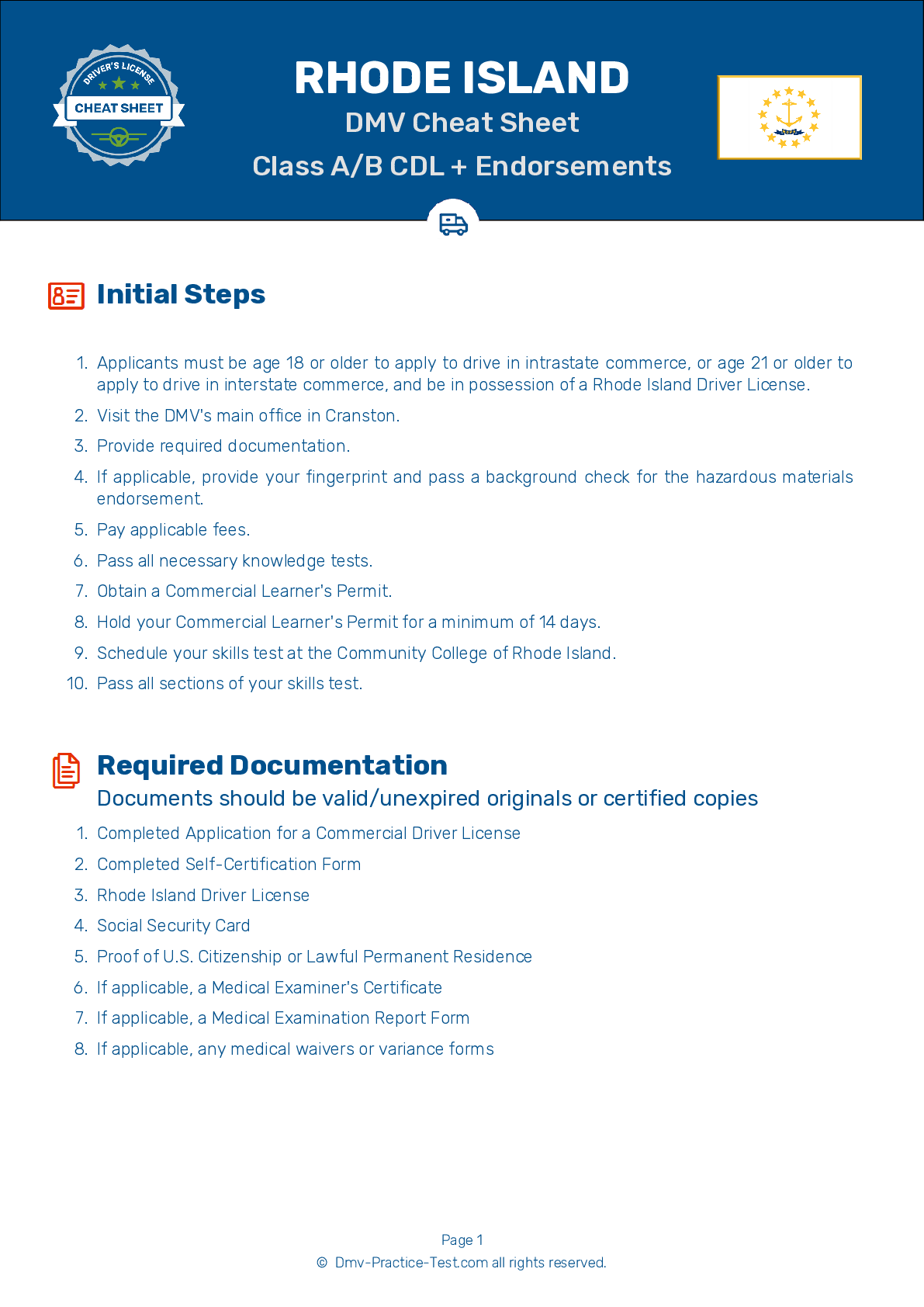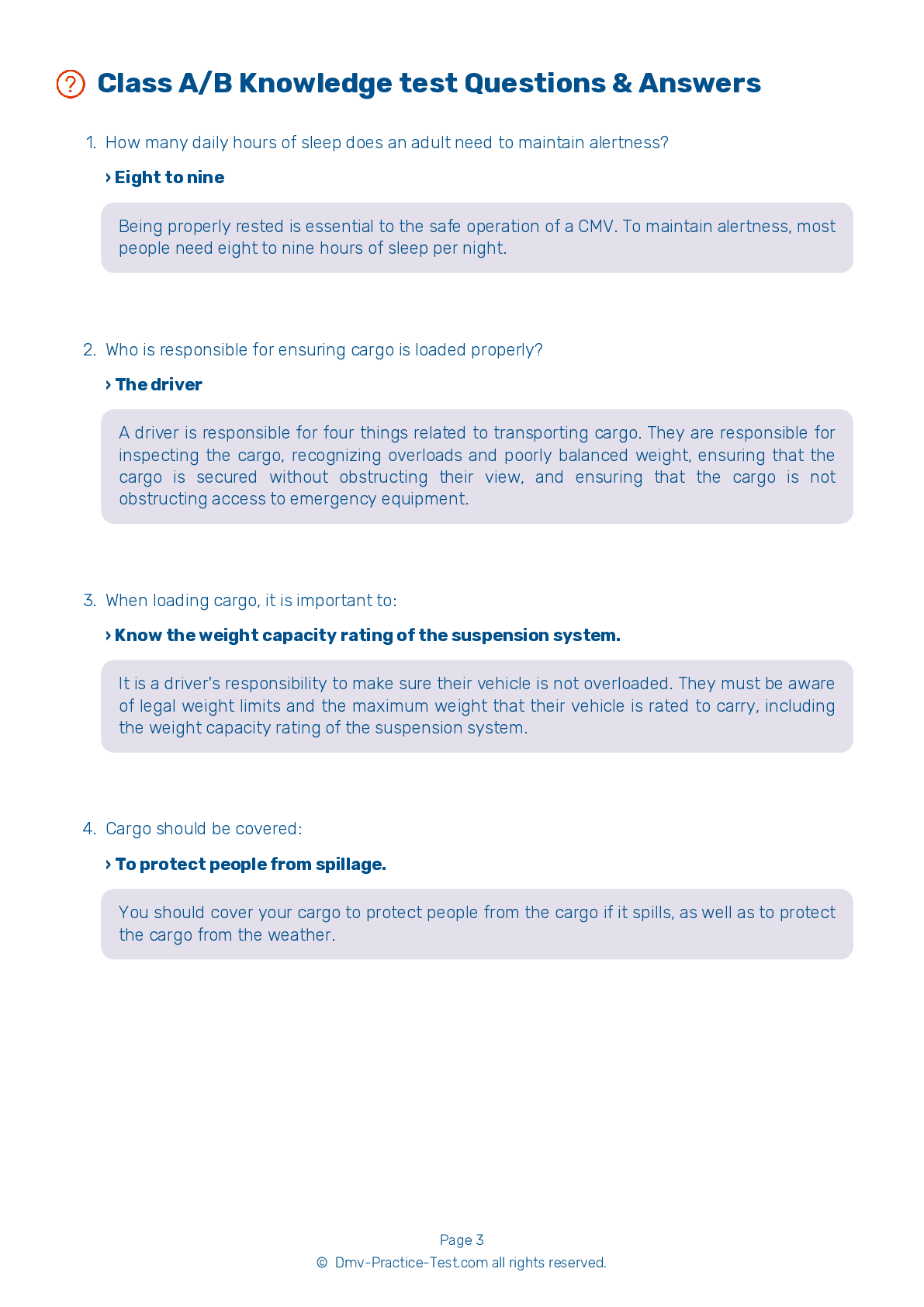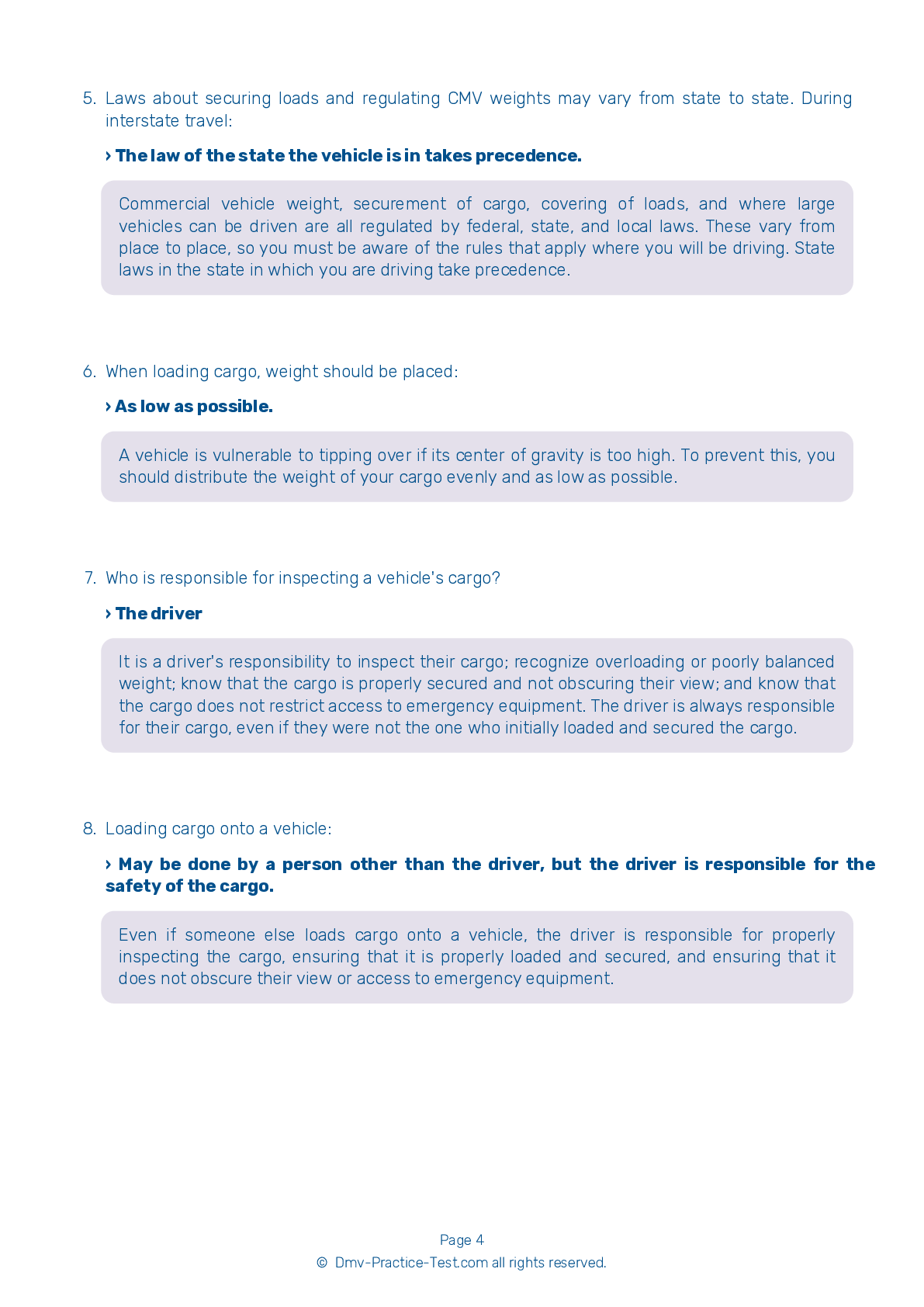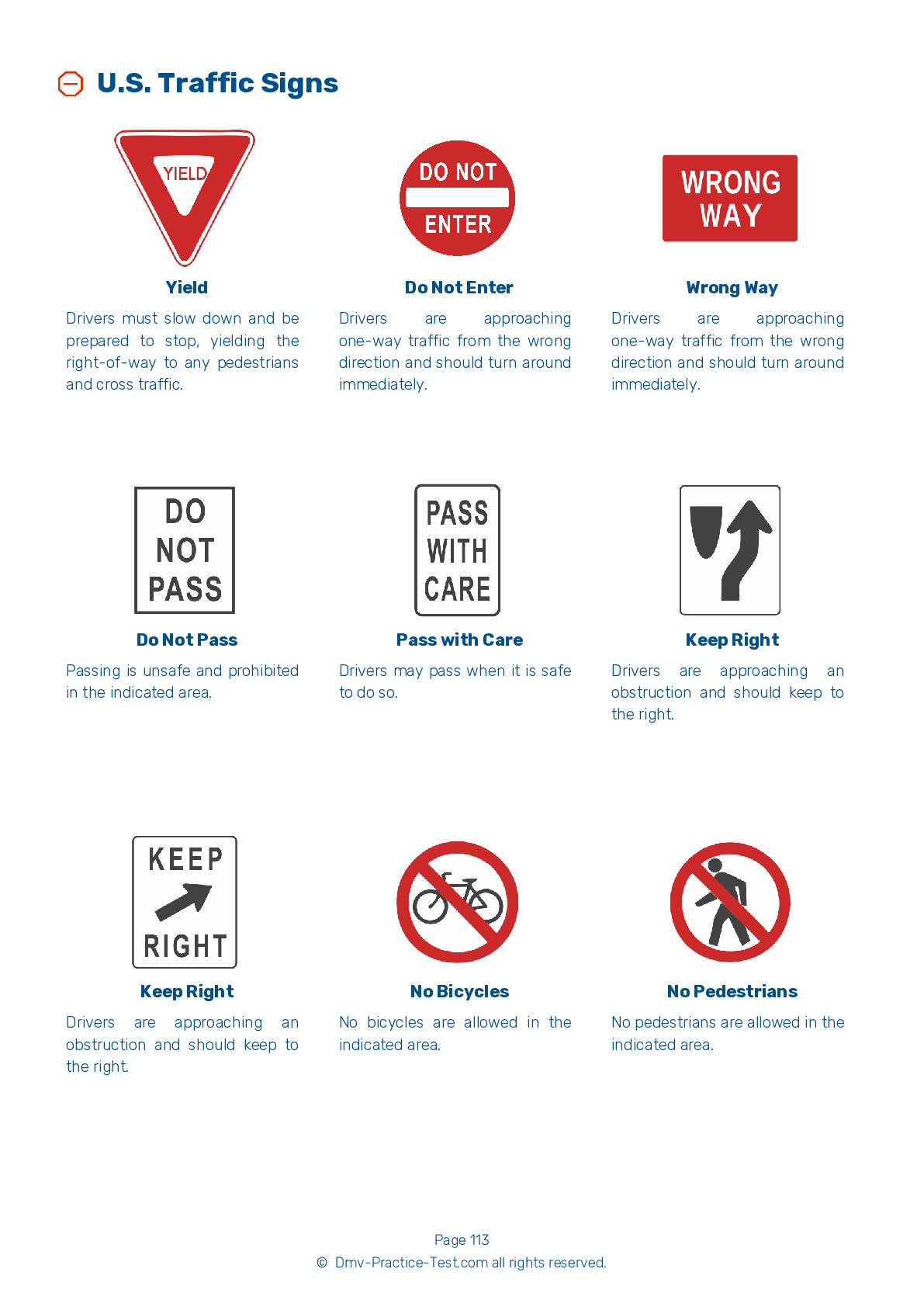Combination #2
Combination Vehicles Practice Test | Rhode Island 2026 #2
Train for FREE online with our Rhode Island CDL combination vehicle test. The official exam test consists of several obligatory parts, with all of them checking your knowledge of different blocks of road rules. If you need to obtain a RI combination license in 2026, practice as much as possible. Free sample tests published on our website will help you check and improve your knowledge and boost your grades. Please bear in mind that DMV requirements for issuing a combination license may vary from state to state.
20
16
20
1 . To help prevent a rollover, cargo should be:
If a vehicle is top-heavy, it is more likely to roll over. The weight of cargo should be positioned as low in a trailer as possible to minimize this risk.
2 . A combination vehicle has ____ air line(s).
Every combination vehicle has two air lines: the service line and the emergency line.
3 . During a trip, landing gear should be:
Landing gear, or trailer supports, should always be completely raised before a vehicle is driven. Landing gear that is not entirely raised could catch on railroad tracks or other hazards on the roadway.
4 . When testing ____, you should apply your vehicle's brakes with the hand control while moving the vehicle forward slowly.
To test the trailer service brakes, you should first ensure that the braking system has a normal air pressure level, then release the parking brake. You should then move the vehicle forward slowly and apply the brakes with the hand control. If the trailer service brakes are working properly, you will feel the brakes activate.
5 . A trolley valve:
The trailer hand valve (also referred to as the trolley valve or Johnson bar) is a mechanism that works the trailer brakes. It should only be used to test the brakes. Using it while the vehicle is being driven could cause a skid. Never use the trailer hand valve while parking because doing so may release the air pressure from the braking system, releasing the brakes that are holding the vehicle in place.
6 . If the emergency air line loses pressure:
The emergency air line controls the emergency brakes on a combination vehicle. A loss of air pressure in the emergency line will cause the emergency trailer brakes to activate.
7 . Keeping cargo centered on a rig can:
A rollover is more likely if cargo is unevenly loaded in a rig. To help prevent a dangerous rollover, it is important to keep a load as centered on the rig as possible.
2026 Rhode Island | Frequently Asked Questions
A CDL Class A license in Rhode Island allows holders to operate any combination of vehicles with a Gross Combination Weight Rating (GCWR) of 26,001 pounds or more, as long as the vehicle(s) being towed have a GVWR of more than 10,000 pounds. It includes tractor-trailers, truck and trailer combinations, tank vehicles, and livestock carriers.
A Class A CDL license in Rhode Island allows the holder to operate a range of large vehicles. This includes but is not limited to tractor-trailers, truck and trailer combinations, tanker vehicles, livestock carriers, and flatbeds. The vehicle's Gross Combination Weight Rating (GCWR) must be 26,001 pounds or more with the towed vehicle exceeding 10,000 pounds.
To obtain a Class A CDL in Rhode Island, you must be at least 18 years old (21 for interstate driving), have a valid Rhode Island driver's license, pass a vision test, and complete a written knowledge test. You'll also need to successfully complete a skills test, which includes a pre-trip vehicle inspection, basic control skills exam, and an on-road driving test.
You must be at least 18 years old to qualify for a Class A CDL license in Rhode Island. However, to drive interstate, or across state lines, you must be at least 21 years old. It's important to note that these age requirements are mandated by federal law and apply in all states.
Specific endorsements are not required for a Class A CDL license but they can broaden the range of vehicles you can operate and cargo you can transport. Endorsements include T (Double/Triple Trailers), P (Passenger Vehicles), N (Tank Vehicles), H (Hazardous Materials), and S (School Buses). Each endorsement requires passing additional written and/or skills tests.
The Class A CDL skills test in Rhode Island encompasses three main components. First, a pre-trip vehicle inspection to assess your ability to evaluate whether your vehicle is safe to drive. Second, a basic control skills exam where you'll demonstrate basic maneuvers like backing up. Lastly, an on-road driving test where you'll be required to navigate various road situations and traffic rules.
Yes, Class A CDL license holders in Rhode Island may face certain restrictions based on their abilities and the type of vehicle they're licensed to operate. For instance, if you cannot operate a manual transmission, you may have an automatic transmission restriction. If you don't pass the air brakes test, you'll have an air brake restriction. These limitations are marked on the CDL license.
Yes, it is possible to take the written Class A CDL test in languages other than English in Rhode Island. The Rhode Island DMV offers the written CDL test in several languages, including Spanish. However, federal regulations require anyone applying for a CDL to read and speak English sufficiently to converse with the general public, understand highway signs and signals, and respond to official inquiries.
Yes, you can request accommodations for the Class A CDL written test in Rhode Island if you have a disability. You'll need to contact the Rhode Island Division of Motor Vehicles in advance to discuss your specific needs and they'll do their best to provide appropriate accommodations to ensure you can take the test fairly.
If you fail the Class A CDL written test in Rhode Island, you'll need to wait at least five days before retaking it. There's no limit to how many times you can retake the test, but you'll need to pay the testing fee again each time. It's advised to study thoroughly before attempting to retake the test.



